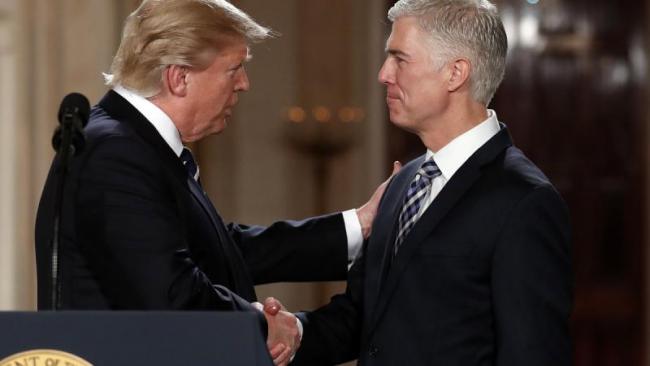Judge Gorsuch for the Win!

By Olivia Grady
On January 31, 2017, President Donald Trump nominated Neil Gorsuch to the U.S. Supreme Court to fill the late Justice Antonin Scalia’s associate justice position.
Judge Gorsuch is a judge on the U.S. Court of Appeals for the Tenth Circuit in Colorado. He was nominated by President George W. Bush on May 10, 2006 and was unanimously confirmed by the Senate on July 20, 2006.
Gorsuch grew up in Colorado, but moved to Washington, D.C. as a teenager when President Ronald Reagan appointed his mother, Anne Gorsuch Burford, the first female head of the U.S. Environmental Protection Agency. In 1988, he received his B.A. from Columbia University, and in 1991, he graduated from Harvard Law School as a Truman Scholar.
After law school, he clerked for Judge David Sentelle on the U.S. Court of Appeals for the D.C. Circuit and then for Supreme Court Justices Byron White and Anthony Kennedy. In 2004, he received a Marshall Scholarship to earn a PhD in Jurisprudence from University College at the University of Oxford.
Before becoming a judge, Gorsuch was a partner at the Washington, D.C. law firm of Kellogg, Huber, Hansen, Todd, Evans & Figel.
Judge Gorsuch is an originalist like Justice Scalia, who believes cases should be decided on what the Constitution says, not what judges think it should say. He is most well known for his concurring opinion on the Hobby Lobby religious freedom case. In that case, Hobby Lobby, a Christian employer, did not want to provide insurance coverage for abortifacients as the Affordable Care Act required because of the owners’ strongly held religious beliefs. In his opinion supporting Hobby Lobby, Gorsuch wrote:
The [Religious Freedom Restoration] Act doesn’t just apply to protect popular religious beliefs: it does perhaps its most important work in protecting unpopular religious beliefs, vindicating this nation’s long-held aspiration to serve as a refuge of religious tolerance.
He is also known for his views on Chevron deference, the practice that courts should defer to the interpretations by executive branch agencies if a Congressional Act is ambiguous. In the 2016 Gutierrez-Brizuela v. Lynch case, he explained why Chevron deference should be eliminated:
But the fact is Chevron and Brand X permit executive bureaucracies to swallow huge amounts of core judicial and legislative power and concentrate federal power in a way that seems more than a little difficult to square with the Constitution of the framers’ design. Maybe the time has come to face the behemoth.
Judge Gorsuch however has not decided many labor cases. He has upheld three NLRB decisions and only dissented on one. In the 14 employment discrimination cases he wrote the majority opinion for, only 9 favored the employer. None of the 14 decisions had a dissent.
In a 2014 case that Gorsuch wrote the opinion for, Hwang v. Kansas State University, the Tenth Circuit found that an employer was not forced to allow employees more than six months’ sick leave or face liability under the Rehabilitation Act in most cases. The case was a sad story where a professor was diagnosed with cancer prior to the start of a school year, and the university was unable to give her more than six months leave. The Court found that the time given was reasonable and that the rule ensured clarity and consistent treatment for all employees.
While Judge Gorsuch’s views on labor issues are not entirely clear, Americans may soon find out where he stands on one labor issue: Right-to-Work.
Janus v. AFSCME is a case that is being decided by the U.S. Court of Appeals for the Seventh Circuit currently. The case was filed by two Illinois government workers, Mark Janus and Brian Trygg, who argue that the agency fees they pay to their union are violating their First Amendment rights. Even non-union members can be forced to pay agency fees for representation services, even though the union is not required to represent them.
The Seventh Circuit will likely rule against the workers, and the case could be appealed to the Supreme Court. If that happens, Judge Gorsuch would have a chance to overturn Abood and ban agency fees.
Abood v. Board of Education is a 1977 Supreme Court case where Detroit public school teachers sued to eliminate agency fees because they opposed the union’s contributions to politicians. The Supreme Court unfortunately unanimously held that nonmembers in the public sector could be forced to pay agency fees for the costs of collective bargaining. While the Supreme Court said that their dues could not be used for political causes, money is fungible. This case needs to be overturned, and the First Amendment rights of these workers restored.
Another example of why it is so important that Judge Gorsuch be confirmed quickly is Friedrichs v. California Teachers Association. That case was a 2016 Supreme Court case where California teachers objected to agency fees and were attempting to overrule Abood. The case likely would have overruled Abood, but Justice Antonin Scalia passed away while the court was deciding it. With Justice Scalia’s death, the court ended up ruling 4-4, meaning the lower court ruling (the liberal U.S. Court of Appeals for the Ninth Circuit ruling upholding Abood) was affirmed.
Although Judge Gorsuch does not have an extensive record on labor decisions, the Center for Worker Freedom is supporting Judge Gorsuch for his adherence to the First Amendment, which last we checked includes workers.
Photo: Conservative Review





